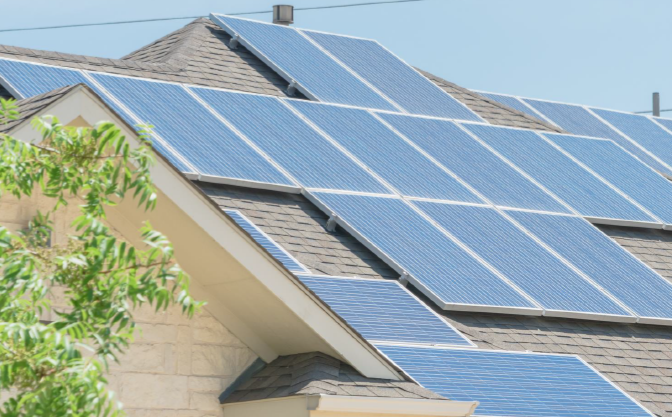
New Value of Solar Study: Rooftop Solar Cuts Costs for the Texas Grid
TXSES commissioned a new study quantifying grid-stabilizing value and cost savings of rooftop solar
For Immediate Release: July 16, 2024
Contact: José Medina, jmedina@citizen.org
AUSTIN, Texas—Energy supplied by rooftop solar is much more valuable than the average kilowatt-hour sent to the ERCOT grid by other means, finds a new study commissioned by the Texas Solar Energy Society (TXSES) and released today by the Texans for Local Energy Freedom Coalition.
The study, Value of Residential Solar in Texas, assesses the technology’s benefits to this fast-growing state.
The study shows that the overall value of distributed solar in ERCOT will be about 27¢/kWh, with 15¢/kWh realized in the generation, transmission, and distribution system and 12¢/kWh realized through air pollutant and emission reduction benefits. Rooftop solar is valuable because it mitigates constraints on the generation and transmission system, reduces harmful emissions from air pollutants, and stimulates the economy through local job creation. Further, when paired with energy storage, it can improve grid resiliency and reliability during severe weather events.
The study details how rooftop solar:
- Provides cost-savings to Texans within the ERCOT electric grid, including reducing the need for new costly infrastructure needed to meet electricity demand
- Improves public health by reducing air pollution from combustion-fired electricity generation, and lowering greenhouse gas emissions
- Additional benefits that are real, but not calculated, include job growth, boosts to local economies, alleviating poverty, and energy insecurity
“As Texas grows and the demand for electricity increases, our analysis demonstrates the value that customer-sited solar brings to Texas.” said Anirudh Kshemendranath, a Senior Consultant with Dunsky Energy + Climate Advisors, the firm commissioned by TXSES for the study. “Customer-sited solar has the potential to alleviate grid constraints and reduce costs for all ratepayers and if valued correctly, can be an important tool to support energy reliability and affordability for all Texans.”
Another recent study details how a patchwork of policies at municipal, cooperative and monopoly investor-owned electric utilities across the state chronically undervalues energy sent to the grid from rooftop solar installations. The same is true for competitive retail electric providers in Texas. Without a fair value of solar, homeowners may decide rooftop solar is not worth the investment, or decide against adopting the technology altogether.
“I first installed solar at my home in 2012,” said Larry Howe, a Plano homeowner. “It was a great decision then, but honestly, it’s harder and harder for folks to justify today given how solar policies vary depending on where you live and which utility covers your area. What a homeowner can get back for the electricity they don’t use is a big factor in their decision to make the financial investment in rooftop solar. Homeowners like me need more certainty that solar compensation rates will be fair the day their panels are installed and 10 or 20 years from now.”
As ERCOT faces challenges maintaining reliability and as market prices increase, many Texas utilities and retail electric providers have slashed the rates they pay customers for energy from rooftop solar, and some have adopted additional monthly fees for customers with rooftop solar. These changes provide a financial disincentive for customers considering rooftop solar.
“If state leaders are serious about keeping the grid stable and affordable, it’s time for them to step in and adopt statewide policies to ensure fair compensation for homeowners and businesses that supply energy from solar installations to the distribution grid,” said Alison Silverstein, a former advisor for the Public Utilities Commission of Texas. “This state had a deadly power outage during Winter Storm Uri and several close calls that we will continue to have for the foreseeable future. Rooftop solar is a key part of avoiding an energy crisis. We just need some regulatory certainty coming from Austin.”
In addition to rising demand, Texans have faced increasing costs to power their homes and an electric grid vulnerable to extreme weather events. Winter Storm Uri in February 2021 and the recent Hurricane Beryl left millions without power. The possibility of targeted blackouts has become a yearly occurrence during the summer months of dangerous heat. Supporting rooftop solar can lower some risks and keep Texas powered and running.
###
About the Texans for Local Energy Freedom Coalition
The Coalition was created by a group of non-partisan organizations — Texas Solar Energy Society, Solar United Neighbors and Public Citizen — to explore possible solutions to what utilities need to reimburse rooftop solar owners to offset the cost of solar being fed back into the grid. The discrepancy and unfairness that homeowners are being paid is sending the wrong market signal for homeowners to adopt solar and the possibility of adding storage to their homes. This discourages homeowners and commercial applications when the state needs ALL options and the grid needs power.
